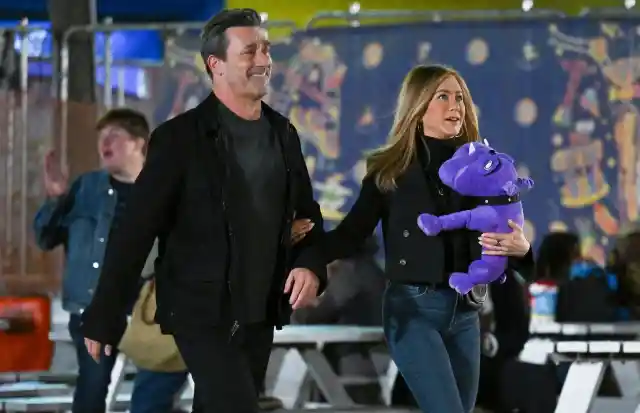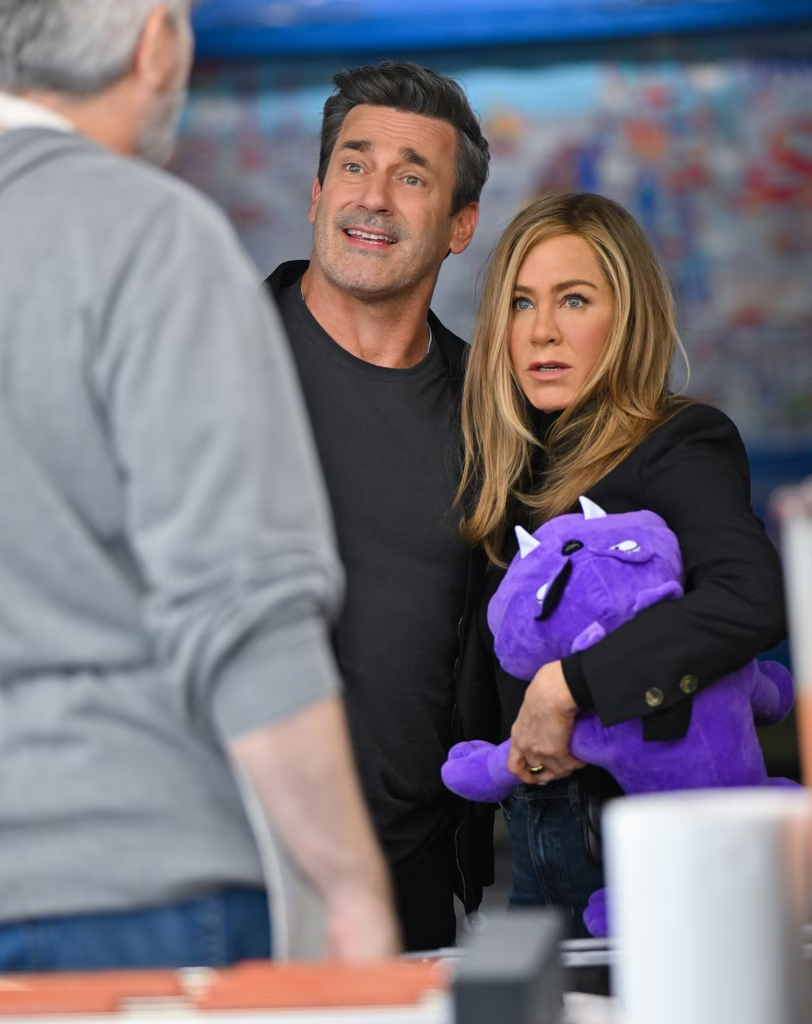The world-famous actress Jennifer Aniston has recently opened up about a rather awkward experience on the set of the hit TV show, The Morning Show. During a joint interview with her co-star Reese Witherspoon, Aniston candidly shared her thoughts on filming an intimate scene with fellow actor Jon Hamm. This unexpected challenge made the scene even more uncomfortable for Aniston, particularly because she wasn't familiar with the concept of having an intimacy coordinator on set. As we delve into the details of this intriguing story, we'll explore the reasons behind Aniston's discomfort and how the entertainment industry is evolving to provide a safer and more comfortable environment for all actors involved in intimate scenes.


Unfamiliar Territory for Aniston
Known for her iconic role as Rachel Green on the popular show Friends, Jennifer Aniston admitted during the interview that she considered herself to be from the "olden days." As a result, she had no idea what an intimacy coordinator was or the purpose they served. When she first heard the term, Aniston humorously remarked, "What does that mean?" Her lack of knowledge about the role only added to the awkwardness she experienced during the filming of the intimate scene.
The Role of an Intimacy Coordinator
For those who are unaware, an intimacy coordinator is an invaluable member of a production's team, responsible for ensuring the emotional and physical well-being of the actors during intimate or sex scenes. Their role encompasses creating a safe environment, establishing boundaries, aiding in choreography, and providing ongoing support to the actors throughout the process. This relatively new addition to the industry is a significant step forward in recognizing the importance of consent, comfort, and professionalism in portraying intimate moments on screen.


Awkwardness to the Max
When Aniston was asked if she wanted an intimacy coordinator present during the filming of the scene with Hamm, she admitted that she felt it was already awkward enough. The notion of having someone continuously monitoring her well-being during such an intimate moment seemed unnecessary to the seasoned actress. With both Aniston and Hamm being experienced actors, they believed they could handle the scene without any additional help. However, Aniston's revelation sheds light on the complexities and discomfort that can arise when filming such scenes.


Grateful for Director Mimi Leder and Co-star Jon Hamm
Despite her initial hesitation, Aniston expressed her gratitude for director Mimi Leder, recognizing her instrumental role in creating a safe and protected environment on set. Leder's professionalism and attention to detail in choreographing the intimate scene provided Aniston with a sense of security, making the experience more manageable. Additionally, Aniston praised her co-star Jon Hamm for his considerate behavior during the filming process. Hamm constantly checked in on Aniston's well-being, ensuring that she felt comfortable and respected throughout the scene.
The Evolution of the Entertainment Industry
Aniston's firsthand experience highlights the ongoing transformations within the entertainment industry. The inclusion of intimacy coordinators is a significant development, emphasizing the commitment to the safety and well-being of actors during intimate scenes. This inclusion marks a remarkable shift, where the industry is placing a greater focus on consent, boundaries, and open communication. With the increased recognition of these critical elements, actors can now feel safer and more empowered to navigate intimate scenes while maintaining their personal comfort levels.


Creating Safer Working Environments
The move towards hiring intimacy coordinators is part of a broader effort to create safer working environments in the entertainment industry. With their expertise, these coordinators help foster trust and open dialogue between actors, allowing them to collaborate in a supportive and controlled setting. This shift represents a significant departure from the past, where actors often experienced discomfort, coercion, or even exploitation during intimate scenes. As the industry takes responsibility for the well-being of its performers, actors can now feel more confident when faced with such demanding scenes.
A Collaborative Effort
The involvement of intimacy coordinators is not solely for the benefit of actors' well-being but also serves the overall production. By incorporating these professionals into the pre-production process, filmmakers and directors can work closely with the actors to ensure that their visions align and that the scenes are executed in a manner that accurately reflects the story. This collaborative effort leads to a more authentic portrayal of intimate moments and helps create a more engaging viewing experience for the audience.
Empowering Actors through Education and Support
In addition to their presence on set, intimacy coordinators also play a crucial role in educating actors about their rights and providing support throughout the filming process. They assist in establishing boundaries and facilitate ongoing discussions about the scenes' emotional impact on the actors. This support system helps actors feel empowered to voice their concerns and ensures that their emotional well-being is prioritized at all times.


Continued Progress
The inclusion of intimacy coordinators is an essential step forward for the industry. As awareness grows and initiatives to ensure safety and well-being gain momentum, the entertainment world is evolving into a more respectful, inclusive, and supportive environment. This progress benefits not only the actors but also the entire ecosystem, as it promotes creativity, fosters open communication, and enhances the quality of the final production.


Conclusion
In a recent interview, Jennifer Aniston opened up about her personal experience while shooting an intimate scene with Jon Hamm. Her candid revelation shed light on the awkwardness and challenges that can arise during such moments on set. Initially, Aniston admitted to being skeptical about the necessity of an intimacy coordinator. However, her positive experience with director Mimi Leder and co-star Jon Hamm changed her perspective completely.
Aniston's testimony emphasizes the crucial importance of creating a safe and comfortable environment for actors during intimate scenes. It underlines the significance of having professionals like intimacy coordinators involved in the entertainment industry. This inclusion signifies a major step forward, showcasing the industry's commitment to prioritizing the well-being and emotional safety of its performers.
The presence of intimacy coordinators ensures that actors feel supported and empowered throughout the filming process. These professionals play a vital role in facilitating clear communication between actors, directors, and the entire production team. They help establish boundaries and provide guidance on how to approach and execute intimate scenes with sensitivity and respect.
The future of intimate scene filmmaking holds great promise as the industry continues to make progress and implement initiatives. There is a growing awareness and recognition of the need for increased respect, communication, and understanding for all those involved in these vulnerable moments on screen. This shift not only benefits the actors but also creates a more inclusive and respectful environment for everyone working in the entertainment industry.
By acknowledging the challenges and embracing the changes brought about by intimacy coordinators, the film industry is taking a significant step towards ensuring that intimate scenes are handled with care and professionalism. Ultimately, this progress will lead to a more positive and empowering experience for actors and a greater appreciation for the artistry and emotional impact of intimate scenes in film and television.